Other
- Pantry, the area to the right and left of the non-volley zone in pickleball
A pantry is a food store. The term may also refer to:
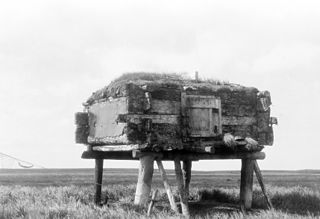
Food storage is a way of decreasing the variability of the food supply in the face of natural, inevitable variability. It allows food to be eaten for some time after harvest rather than solely immediately. It is both a traditional domestic skill and, in the form of food logistics, an important industrial and commercial activity. Food preservation, storage, and transport, including timely delivery to consumers, are important to food security, especially for the majority of people throughout the world who rely on others to produce their food.

Pennsylvania Dutch English is a dialect of English that has been influenced by the Pennsylvania Dutch language. It is largely spoken in South Central Pennsylvania, both by people who are monolingual and bilingual. The dialect has been dying out, as non-Amish younger Pennsylvania Germans tend to speak General American English. Very few non-Amish members of these people can speak the Pennsylvania German language, although most know some words and phrases. The World War II Generation was the last generation in which Pennsylvania Dutch was widely spoken outside the Old Order Amish and Old Order Mennonite communities.
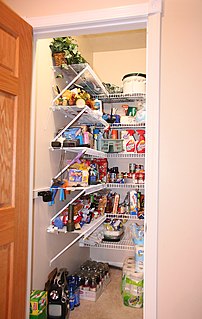
A pantry is a room or cupboard where beverages, food, and sometimes dishes, household cleaning chemicals, linens, or provisions are stored. Food and beverage pantries serve in an ancillary capacity to the kitchen.
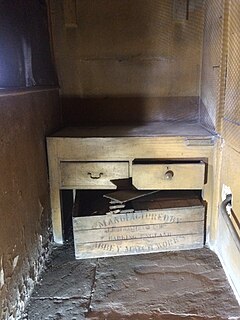
A larder is a cool area for storing food prior to use. Originally, it was where raw meat was larded—covered in fat—to be preserved. By the 18th century, the term had expanded. Now a dry larder was where bread, pastry, milk, butter, or cooked meats were stored. Larders were commonplace in houses before the widespread use of the refrigerator.
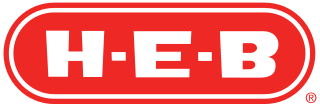
H-E-B Grocery Company, LP is an American privately held supermarket chain based in San Antonio, Texas, with more than 340 stores throughout the U.S. state of Texas, as well as in northeast Mexico. The company also operates Central Market, an upscale organic and fine foods retailer. As of 2019, the company has a total revenue surpassing US$31.2 billion. H-E-B ranked No. 9 on Forbes' 2020 list of "America's Largest Private Companies". H-E-B was named Retailer of the Year in 2010 by Progressive Grocer. Supermarket News ranks H-E-B 13th on the list of "Top 75 North American Food Retailers" by sales. Based on 2019 revenues, H-E-B is the 19th largest retailer in the United States. It donates 5% of pre-tax profits to charity. The official mascot of H-E-B is named H-E-Buddy, an anthropomorphic brown grocery bag, with multiple grocery items being shown coming out of the top.
Plaid Pantry is a chain of privately owned convenience stores based in Beaverton, Oregon, United States. Of 108 locations, one is in the Seattle, Washington area, eight are near Salem, and the remainder are in the Portland metropolitan area.

Marsh Supermarkets was an American retail food chain headquartered in Indianapolis, Indiana, with a peak number of 86 stores in 2013 located throughout central Indiana and parts of western Ohio. Its eventual parent company was Sun Capital Partners, headquartered in Boca Raton, Florida.

White Hen Pantry was a Lombard, Illinois-based chain of approximately 261 predominantly franchisee-owned convenience stores located in and around Detroit, Boston / southern New Hampshire, southern Wisconsin, northwest Indiana and central Illinois areas of the United States. Most of the stores were open 24 hours and offered an array of standard convenience store fare such as coffees, cappuccinos, frozen and dry goods and toiletries. Many also had full delis serving boxed sandwiches and salads, name-brand meats and cheeses and fresh fruits and vegetables. White Hen's array of services included catering options and sales of external holiday gift cards. Most stores also had ATMs and provide lottery ticket sales; White Hen was the largest lottery ticket vendor in the state of Illinois.

The Pantry, Inc. was a publicly traded convenience store chain based in Cary, North Carolina that operated Kangaroo Express stores. The Pantry was founded in 1967 by Sam Wornom and Truby Proctor, Jr. in Sanford, North Carolina The company has been publicly traded since June 1999 and owned by investors since 1987, when then investor Montrose Capital purchased controlling shares from Wornom and Proctor. Recent CEOs have included the former chairman of the board and interim CEO Edwin J. Holman, who took over after Terrance M. Marks, the former president and CEO, resigned in December 2011. Dennis Hatchell is the current CEO of the company as of 2012.
The Penn Fruit Company was a regional grocery chain in the Philadelphia and Baltimore areas that operated from 1927 until 1978. During the firm's history it was regarded as one of the most innovative American supermarket chains. However, the company's innovations often were copied by its bigger rivals who eventually succeeded in causing the chain's demise.

The Mall at 163rd Street is an enclosed shopping mall and power center in North Miami Beach, Florida. From its opening as an open-air shopping center in 1956, it has been converted into an enclosed mall, but was later redeveloped as a combination of both formats. The mall's anchors are The Home Depot, Marshalls, Ross, and Wal-Mart Supercenter.

Pantry Panic is the third animated cartoon short in the Woody Woodpecker series. Released theatrically on November 24, 1941, the film was produced by Walter Lantz Productions and distributed by Universal Pictures. This is the only cartoon of when Woody doesn't say "Guess Who?", although his trademark laugh is still present.
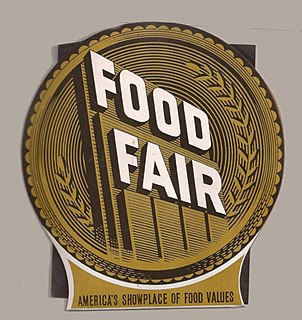
Food Fair, also known by its successor name Pantry Pride, was a large supermarket chain in the United States. It was founded by Samuel N. Friedland, who opened the first store in Harrisburg, Pennsylvania in the late 1920s. As of 1957, Food Fair had 275 stores, and at its peak, the chain had more than 500 stores. Friedland's family retained control of the firm through 1978, when the chain entered bankruptcy.

In organization theory, mutual aid is a voluntary reciprocal exchange of resources and services for mutual benefit. Mutual aid projects are a form of political participation in which people take responsibility for caring for one another and changing political conditions.
VPS Convenience Store Group was an American convenience store chain headquartered in Wilmington, North Carolina that could trace its roots to the founding of the first Village Pantry convenience store in 1966. VPS was sold in two parts in 2013 and 2015 to GPM Investments.

Ashley Landing is a shopping mall in Charleston, South Carolina, United States. It was the first indoor shopping mall in the West Ashley area of Charleston when the complex was fully completed in 1972. The center, located at 1401 Sam Rittenberg Boulevard at the fork of Old Towne Road was developed by Gate City Realty Company of Fort Lauderdale, Florida. Ground was broken for the complex in 1962 with Ashley Plaza opening on April 16, 1964. At its opening the shopping center consisted of J.M. Fields Department Stores joined to a Pantry Pride supermarket, built at a cost of $1.75 million and owned by Sumar Corporation of South Carolina. The locally owned Condon's Department Store, constructed adjacent to Pantry Pride as a freestanding building, became the third tenant when it opened in 1970. The center, originally known as "Ashley Plaza" was noted for its large red and white neon pylon "Ashley Plaza" sign in the center of the parking lot that remained until 1989 when it was destroyed by Hurricane Hugo.
Amazon Fresh is a subsidiary of the American e-commerce company Amazon.com in Seattle, Washington. It is a grocery delivery service currently available in most major U.S. cities, as well as some international cities, such as Berlin, Hamburg, London, Milan, Munich, Rome, Tokyo, and some other locations in Singapore and India. In 2020, Amazon Fresh opened several physical store locations in the United States. The first six stores opened in the Los Angeles area with additional locations in the Chicago, Philadelphia, Seattle, and Washington, D.C. areas.

Amazon Prime is a paid subscription service from Amazon which is available in various countries and gives users access to additional services otherwise unavailable or available at a premium to other Amazon customers. Services include same, one or two-day delivery of goods and streaming music, video, e-books, gaming and grocery shopping services. In April 2021, Amazon reported that Prime had more than 200 million subscribers worldwide.
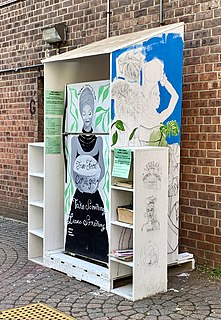
A community fridge is a refrigerator located in a public space. Sometimes called freedges, they are a type of mutual aid project that enables food to be shared within a community. Some community fridges also have an associated area for non-perishable food. Unlike traditional food pantries, these grassroots projects encourage anyone can put food in and take food out without limit, helping to remove the stigma from its use. The fridges take a decentralized approach, often being maintained by a network of volunteers, community members, local businesses, and larger organizations. Food in community fridges is primarily donated by individuals or food rescue organizations and can be sourced from a variety of places. Major grocers like Trader Joe's and Whole Foods donate large amounts of excess foods to food rescue organizations that then donate to these fridges. The food donated would have otherwise been thrown out.

Community pantries in the Philippines are food banks established by Filipinos during the country's COVID-19 community quarantine.